| Srl | Item |
| 1 |
ID:
113839
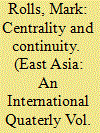

|
|
|
|
|
| Publication |
2012.
|
| Summary/Abstract |
Security has undoubtedly been a central and continuous feature of ASEAN since its establishment. While it has modified its basic thinking on security and adapted elements of the attendant principles, aims and ways of operation to meet changed circumstances, the level of consistency is still readily observable. Centrality of a different sort has been evident, too, during the post-Cold War period. ASEAN has consciously sought to position itself at the heart of the developing security architecture in both East Asia and the wider Asia-Pacific. The Association has been largely successful at limiting competition and preventing inter-state conflict among its members and at fostering a stable regional order in Southeast Asia (and an incipient one outside of the boundaries of Southeast Asia). Broadly speaking, this stability has been aided and abetted by the policies of the major external powers in whose interests it has been, up until now. The extent to which a stable regional order remains in the interests of the major powers will be one of the great questions for the next phase of ASEAN's life.
|
|
|
|
|
|
|
|
|
|
|
|
|
|
|
|
| 2 |
ID:
133911
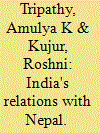

|
|
|
|
|
| Publication |
2014.
|
| Summary/Abstract |
It can be safely concluded that external powers have more to do in Nepali domestic politics, than Nepalis themselves do. It is unlikely that Nepal would have a smooth sail in the near future. With the intensifying contentions, both overt and covert, between and among China, the US and India, Nepal's politics can hardly be expected to have a democratic regime in the years to come. The things will become stable once the present cat-and-dog contention in the Himalayan Asia reaches saturation and a conclusive end. Timeframe and modus operandi for that cannot be predicted, for various variables could differ the state of affairs. It is US and China's interest to control the region.
|
|
|
|
|
|
|
|
|
|
|
|
|
|
|
|
| 3 |
ID:
184447
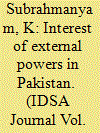

|
|
|
| 4 |
ID:
129934
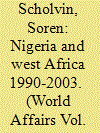

|
|
|
|
|
| Publication |
2014.
|
| Summary/Abstract |
Sören Scholvin sheds light on Nigeria as a regional power from 1990 to 2003, a time marked by the country's numerous security interventions in West Africa. The main finding is that while Nigeria demonstrated its regional dominance, realised some specific objectives and mostly kept external powers out of the area, it failed to gain broadbased support from neighbours as it often acted unilaterally.
|
|
|
|
|
|
|
|
|
|
|
|
|
|
|
|
| 5 |
ID:
174812
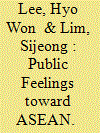

|
|
|
|
|
| Summary/Abstract |
What determines how ASEAN is perceived by the citizens of its member states? Most studies on ASEAN take a state-centric and elite-oriented viewpoint. We improve on this by bringing the people of ASEAN into the center of the analysis. Considering lessons from the European Union’s internal legitimacy crisis, we develop hypotheses on how skill-based economic interests, sociocultural beliefs, and assessments of national context shape people’s attitude to ASEAN. Our hypotheses are tested using the latest data from the Asian Barometer Survey, covering eight of the 10 ASEAN countries. We find that citizen confidence in domestic governance and a positive assessment of major extra-regional powers are associated with a closer identification with ASEAN. Our analysis also identifies age and gender cleavages. ASEAN affinity is higher among older rather than younger and male rather than female respondents. Our findings have important policy implications for the proponents of ASEAN.
|
|
|
|
|
|
|
|
|
|
|
|
|
|
|
|
| 6 |
ID:
134117
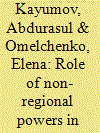

|
|
|
|
|
| Publication |
2014.
|
| Summary/Abstract |
Water as the least regulated issue is currently one of the key security factors in Central Asia. Although some efforts are made to regulate water through the establishment of a regional water regime, yet it remains unresolved. It has been stated that the involvement of international actors can have a positive effect on the solution of the problem. The analysis in this article shows that non-regional powers do not necessarily play a positive role in Central Asia. The water and energy nexus is often used by external powers as a geopolitical tool to influence regional countries for own political and economic interests.
|
|
|
|
|
|
|
|
|
|
|
|
|
|
|
|
| 7 |
ID:
124190
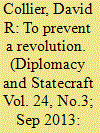

|
|
|
|
|
| Publication |
2013.
|
| Summary/Abstract |
John F. Kennedy came to power in 1961 with Iran on the verge of revolution against the Shah's unpopular policies. To stabilise the situation, his Administration attempted to promote democracy through a development plan based on the precepts of modernisation theory. Backed by academic theorists who argued that promoting democracy was the best way to secure victory in the Cold War, Kennedy developed an ambitious plan to transform Iran. This policy was seen as essential to replace the inevitable uncontrollable revolution and subsequent loss of Iran, with one controlled and directed by Washington. This analysis provides the first comprehensive examination of this plan and its foundations that has heretofore been overlooked. Kennedy's policy towards Iran illuminates the role that external powers can have in manufacturing, supporting, and encouraging a country's transition to democracy. Its failure, and the absence of any replacement plan to ensure political reform, made inevitable the uncontrollable revolution which eventually came in 1978.
|
|
|
|
|
|
|
|
|
|
|
|
|
|
|
|
| 8 |
ID:
139366


|
|
|
|
|
| Summary/Abstract |
The crisis in Yemen has been complicated by number of actors, their interest and also policies of external powers. It cannot be analyzed by focusing only on Sunni-Shia conflict in Yemen and support of Saudi Arabia and Iran in terms of this sectarian division. The division within Yemen as South and North was product of colonial history and cold war politics. Conflicts among regions, sects, power struggle among elites and conflicts of interests and proxy wars of other States are major factors in shaping current situation of Yemen. The aim of this article is to identify the interests of different actors in the recent Yemeni conflict by analyzing their relationship in past and expected strategies for future
|
|
|
|
|
|
|
|
|
|
|
|
|
|
|
|